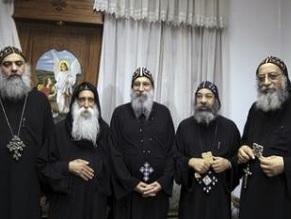|
World Jewish News

New Coptic Pope Tawdros (On Right) with candidates Photo: Mohamed Abd El Ghany / Reuters
|
Egypt’s Coptic pope: Things will get better
12.09.2013, Israel and the World On Wednesday, the first day of the Christian Coptic New Year, Egypt’s Coptic Pope Twadros II said he believes the country will recover from its current problems.
Optimistic, he compared Egypt to a woman in labor, stating, “All of this will turn into happiness when a child is born and a new life begins,” according to Ahram Online.
Since the onset of the Arab uprisings in 2010, which have resulted in revolutions, power vacuums and increased religious and sectarian tensions, Christians have been on the defensive.
Christians in Egypt have been tormented by Islamists and have thrown their support behind military leader Gen. Abdel Fattah al-Sisi, who seems to be the ultimate power broker in the country.
He has led a massive crackdown on Islamists in the Sinai and on the Muslim Brotherhood, arresting its leaders and breaking up their protests.
Raymond Ibrahim, a Shillman Fellow at the David Horowitz Freedom Center and associate fellow at the Middle East Forum, recently authored Crucified Again: Exposing Islam’s New War on Christians. He keeps track of violence perpetrated by Muslims against Christians, with a particular focus on the Arab world.
“In the big picture, it is certainly not inconceivable that Christians could go the way of the Jews,” Ibrahim told The Jerusalem Post, referring to the long-term presence of Jews in Middle Eastern countries and their subsequent expulsion and flight.
Ibrahim tries to put the recent violence into perspective, pointing out that in the seventh century, when Islam burst onto the scene, many of the lands it conquered had a Christian majority – from Syria in the east to Spain in the west.
“That countries like Syria and Egypt are now Muslim majority is a testimony to the fact that Christians have been going the way of the Jews, though, because of their [Christians’] very large numbers that they started with, it’s obviously taking longer,” he said.
In a recent article, he wrote about the kidnapping of Wahid Jacob, a young Christian deacon who had served at St. John the Baptist Church in Asyut, Egypt.
Jacob was abducted on August 21, and his kidnappers demanded a ransom in the range of $171,000. His family was unable to pay such an exorbitant sum; he was subsequently executed, and his body was found in a field with signs of torture.
This phenomenon is increasingly common, Ibrahim said, adding that some victims were killed even after a ransom had been paid.
He cited the fate of six-yearold Cyril Joseph, who was kidnapped in May, murdered and thrown into the toilet even though his family had paid approximately $4,300 for his release.
In Syria, Christians fear the Islamist-led opposition and, to protect their best interests, have tended to support Syrian President Bashar Assad.
The battle for the Syrian Christian town of Maaloula continued on Wednesday, according to a BBC report, despite claims by the government that it had retaken it.
The majority of the town’s 3,300 residents have fled to safer parts of the country, such as Damascus, according to the report. Nusra Front fighters, linked to al-Qaida, have desecrated churches and statues they had claimed.
The million or so Christians in Iraq have suffered enormously since the Western invasion in 2003, and it is estimated that approximately half of that population has left.
At the beginning of the 20th century, Ibrahim said, “Christians accounted for some 20 percent of the population in the Middle East; today, 2 percent.”
If this trend is not reversed, “Christians may well disappear entirely from the Middle East,” he stated.
The Post asked if the current wave against radical Islam, with Sisi’s takeover in Egypt and protests in Tunisia against the Islamist-led government, was helping Christians.
Ibrahim responded that in the long run, this development is positive, but in the short term, “Christians are suffering more now than at any other time in the modern era,” with much of it due to Brotherhood reprisals in Egypt.
“What is important is that Muslims themselves – moderates, secularists, liberals – are rejecting the Islamist agenda and its Brotherhood purveyors,” he said, adding, “if they continue and do not give in and ultimately root out the Islamist cancer, things will eventually be much better for the Copts, or so one hopes.”
Asked if there are any powerful countries moving to protect Christians in the region, he observed that the country most active in dealing with this issue is Russia and that President Vladimir Putin has been speaking directly about the problem.
The Russian Orthodox Church has been involved in raising funds to aid the region’s Christians. In a speech at a meeting with Orthodox churches in Moscow, Putin said: “As a result of the tragedy happening in Syria today, we face a terrible tragedy of losing the Christian presence in that country. If it does take place, the neighboring countries will not stand aside. We cannot allow having the Christian presence devastated in the Middle East. It will be a civilizational catastrophe.
Our sources are from there, our faith is from there [and] the old Patriarchates are there,” he said, as quoted by the Pravmir website.
On the other hand, he said, governments in the West tend to “gloss over this phenomenon, if not enable it, through their inexplicable support for the Muslim Brotherhood in places like Egypt and in Syria by supporting the Islamist-dominated opposition.”
JPost.com
|
|
